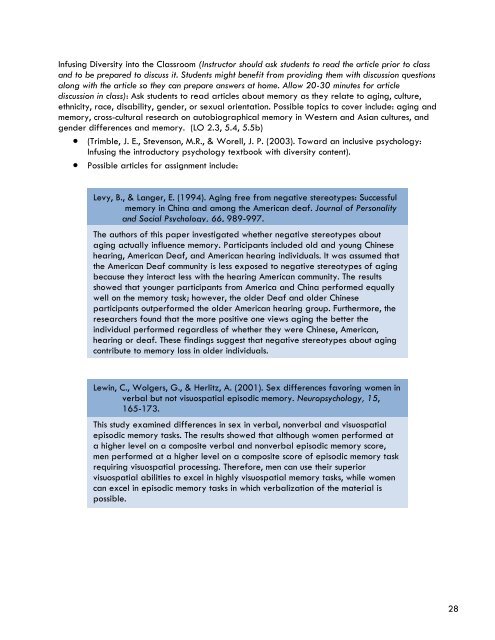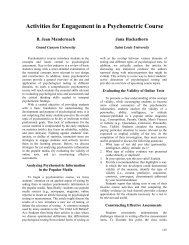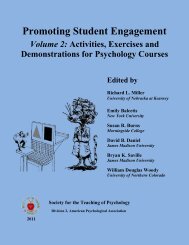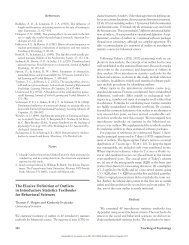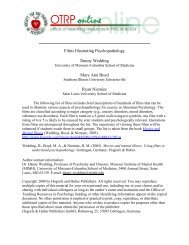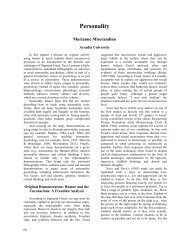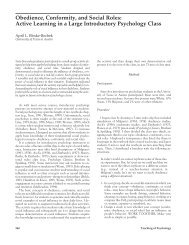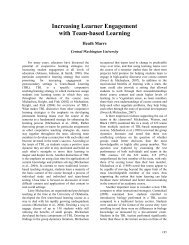INTRODUCTORY PSYCHOLOGY TEACHING PRIMER Early Career ...
INTRODUCTORY PSYCHOLOGY TEACHING PRIMER Early Career ...
INTRODUCTORY PSYCHOLOGY TEACHING PRIMER Early Career ...
You also want an ePaper? Increase the reach of your titles
YUMPU automatically turns print PDFs into web optimized ePapers that Google loves.
Infusing Diversity into the Classroom (Instructor should ask students to read the article prior to class<br />
and to be prepared to discuss it. Students might benefit from providing them with discussion questions<br />
along with the article so they can prepare answers at home. Allow 20-30 minutes for article<br />
discussion in class): Ask students to read articles about memory as they relate to aging, culture,<br />
ethnicity, race, disability, gender, or sexual orientation. Possible topics to cover include: aging and<br />
memory, cross-cultural research on autobiographical memory in Western and Asian cultures, and<br />
gender differences and memory. (LO 2.3, 5.4, 5.5b)<br />
• (Trimble, J. E., Stevenson, M.R., & Worell, J. P. (2003). Toward an inclusive psychology:<br />
Infusing the introductory psychology textbook with diversity content).<br />
• Possible articles for assignment include:<br />
Levy, B., & Langer, E. (1994). Aging free from negative stereotypes: Successful<br />
memory in China and among the American deaf. Journal of Personality<br />
and Social Psychology, 66, 989-997.<br />
The authors of this paper investigated whether negative stereotypes about<br />
aging actually influence memory. Participants included old and young Chinese<br />
hearing, American Deaf, and American hearing individuals. It was assumed that<br />
the American Deaf community is less exposed to negative stereotypes of aging<br />
because they interact less with the hearing American community. The results<br />
showed that younger participants from America and China performed equally<br />
well on the memory task; however, the older Deaf and older Chinese<br />
participants outperformed the older American hearing group. Furthermore, the<br />
researchers found that the more positive one views aging the better the<br />
individual performed regardless of whether they were Chinese, American,<br />
hearing or deaf. These findings suggest that negative stereotypes about aging<br />
contribute to memory loss in older individuals.<br />
Lewin, C., Wolgers, G., & Herlitz, A. (2001). Sex differences favoring women in<br />
verbal but not visuospatial episodic memory. Neuropsychology, 15,<br />
165-173.<br />
This study examined differences in sex in verbal, nonverbal and visuospatial<br />
episodic memory tasks. The results showed that although women performed at<br />
a higher level on a composite verbal and nonverbal episodic memory score,<br />
men performed at a higher level on a composite score of episodic memory task<br />
requiring visuospatial processing. Therefore, men can use their superior<br />
visuospatial abilities to excel in highly visuospatial memory tasks, while women<br />
can excel in episodic memory tasks in which verbalization of the material is<br />
possible.<br />
28


